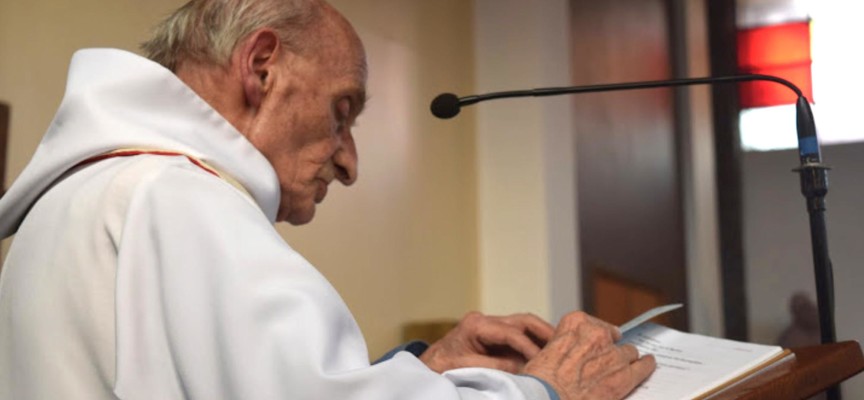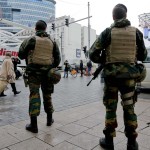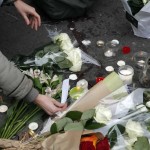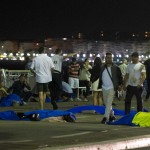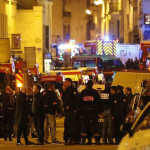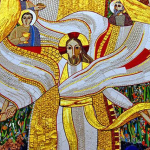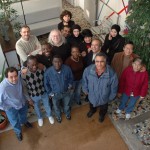A parish church on a summer morning. It is almost empty. Only a few people who went to church to bring the world in their prayer. We imagine them elderly, like the priest who presides over the assembly. Born in 1930, ordained a priest in 1958, Father Jacques Hamel has dedicated his life to proclaiming hope, never seeking honors. He still services with humility, like many other priests “in active retirement”. The result, this brutal irruption of barbarism, we refuse to describe. The only words that are on our mouths are those spoken by the archbishop of Rouen from the World Youth Day in Krakow: “I cry to God”. They belong to Psalm 129: “Out of the depths I have cried unto Thee, O Lord! Lord, hear my voice. Let Thine ears be attentive to the voice of my supplication!”.
It is a cry of pain, a cry of anguish in front of the mystery of evil. A cry of anger in the face of the fanatical violence that is plunging our land, our world into blood. All these unarmed people, all these lives cut short, men, women, children, without distinction of nationality or religion. From Baghdad to Orlando, from Nice to Saint-Etienne-du-Rouvray… No cause can justify such an abomination. The slightest indulgence in such acts, even the one that takes the form of cowardly silence, must be condemned.
But our cry to God is also a plea for help to resist the temptation of revenge. “The Catholic Church cannot take other weapons than prayer and fraternity among men”, continued Bishop Dominique Lebrun before leaving Poland to return to his diocese. Fraternity, a difficult word to hear in the chain of tragedies. It reminds us that answer hatred with hatred would be the triumph of evil.
Guillaume Goubert
(source: La Croix – July 26th, 2016)
Una chiesa parrocchiale in una mattina d’estate. È quasi vuota. Solo poche persone che sono andate a messa per portare il mondo nella loro preghiera. Ce li immaginiamo anziani, come il sacerdote che presiede l’assemblea. Nato nel 1930, ordinato sacerdote nel 1958, padre Jacques Hamel ha dedicato la sua vita ad annunciare la speranza, senza mai cercare onori. E rende ancora servizio con umiltà, come tanti altri sacerdoti “in ritiro attivo”. Il seguito, questa irruzione brutale di barbarie, ci si rifiuta di descriverla. Le uniche parole che vengono sulle nostre bocche sono quelle pronunciate dall’arcivescovo di Rouen dalla GMG di Cracovia: “Io grido a Dio”. Vengono dal Salmo 129: “Dal profondo a te grido, o Signore, ascolta la mia voce! Il tuo orecchio sia attento al grido della mia preghiera!”.
È un grido di dolore, un grido di angoscia di fronte al mistero del male. Un grido di rabbia di fronte alla violenza fanatica che insanguina la nostra terra, il nostro mondo. Tutte queste persone disarmate, tutte queste vite stroncate, uomini, donne, bambini, senza distinzione di nazionalità o di religione. Da Baghdad a Orlando, da Nizza a Saint-Étienne-du-Rouvray… Nessuna causa può giustificare un simile abominio. La minima indulgenza verso tali atti, anche quella che prende la forma del silenzio vile, deve essere condannata.
Ma il nostro grido a Dio è anche una richiesta di aiuto per resistere alla tentazione della vendetta. “La Chiesa cattolica non può prendere altre armi che la preghiera e la fraternità tra gli uomini”, ha detto ancora il vescovo Dominique Lebrun prima di lasciare la Polonia per tornare nella sua diocesi. Fraternità, una parola difficile da sentire nella catena di tragedie. Ci ricorda che rispondere all’odio con l’odio sarebbe il trionfo del male.
Guillaume Goubert
(fonte: La Croix – 26 luglio 2016)
Rouen: résister à la tentation de la vengeance
Une église paroissiale par un matin d’été. Elle est presque vide. Juste quelques personnes qui sont venues à la messe afin de porter le monde dans leur prière. On les imagine âgées, comme le prêtre qui préside l’assemblée. Né en 1930, ordonné en 1958, le P. Jacques Hamel a consacré sa vie à annoncer l’espérance, sans jamais chercher les honneurs. Et il rend encore service, humblement, comme tant d’autres prêtres “en retraite active”. La suite, cette irruption brutale de la barbarie, on se refuse à la décrire. Les seuls mots qui viennent à notre bouche sont ceux prononcés par l’archevêque de Rouen depuis les JMJ de Cracovie : “Je crie vers Dieu”. Ils viennent du psaume 129 : “Des profondeurs je crie vers toi, Seigneur, écoute mon appel ! Que ton oreille se fasse attentive au cri de ma prière!”.
C’est un cri de douleur, un cri de désarroi face au mystère du mal. Un cri de colère face à la violence fanatique qui ensanglante notre terre, notre monde. Toutes ces personnes désarmées, toutes ces vies fauchées, hommes, femmes, enfants, sans distinction de nationalité ou de religion. De Bagdad à Orlando, de Nice à Saint-Étienne-du-Rouvray… Aucune cause ne peut justifier une telle abomination. La moindre complaisance envers de tels actes, même celle qui prend la forme d’un lâche silence, doit être condamnée.
Mais notre cri vers Dieu est aussi un appel à l’aide pour résister à la tentation de la vengeance. “L’Église catholique ne peut prendre d’autres armes que la prière et la fraternité entre les hommes”, a dit encore Mgr Dominique Lebrun avant de quitter la Pologne pour rentrer dans son diocèse. Fraternité, un mot difficile à entendre dans l’enchaînement des drames. Il nous rappelle ceci: répondre à la haine par la haine serait le triomphe du mal.
Guillaume Goubert
(source: La Croix – 26 juillet 2016)
Latest posts by EURCOM (see all)
- What are the aims of the European security and defence policy? - 12 aprile 2017
- The Church is for the European project - 28 marzo 2017
- A message for Europe - 28 marzo 2017

